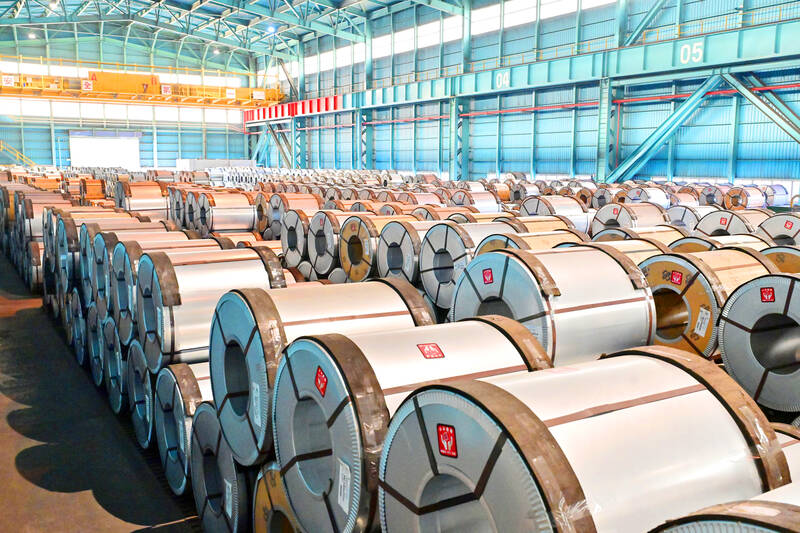China Steel Corp (CSC, 中鋼), the nation’s largest steelmaker, yesterday said it would keep prices intact for some products and make small increases for others next month, as end-market demand needs more time to recover and customers favor low inventory toward the year’s end.
Prices for hot-rolled steel plates, hot-rolled steel coil, cold-rolled steel coil, and steel coil would increase by NT$300 per tonne, the Kaohsiung-based company said.
However, prices would remain unchanged for electro-galvanized steel coils, electrical steel coils and galvanized steel coils used in home appliances and computers, it said.

Photo courtesy of China Steel Corp
CSC said it arrived at the decision after taking into consideration the presidential transition in the US and the introduction of stimulus measures in China.
CSC added it would adopt flexible measures to help upstream and downstream firms improve their business and capacity, in line with market trends and the principle of pricing stability.
The global steel market has observed mixed fortunes, with the global economy gaining momentum, but currency exchange rates and raw material prices have grown increasingly volatile, it said.
The US presidential election has come to a peaceful end, removing uncertainty over its outcome, the company said.
At the same time, China announced a 10 trillion yuan (US$1.3 billion) program to relieve debt pressures on local governments and provide room for fiscal stimulus measures next year, it said.
Overall, the global steel supply remains tight, but it would take some time for the manufacturing industry and end-market demand to emerge from the woods, it said.
US president-elect Donald Trump’s return to the White House might bring new US-China trade disputes that could weigh on Chinese exports, the steelmaker said.
Taiwan has imposed anti-dumping duties on China’s galvanized steel products with the case on hot-rolled steel under way, it said.
Local firms should avoid using China’s low-price steel raw materials in their finished products or semi-finished products to reduce the risk of entanglement in a US-China trade war, CSC said.
Such voluntary practices would lend the Taiwanese government a helping hand in its effort to seek an exemption from US steel tariffs, the company said.
According to the World Steel Association, global steel demand would climb 1.2 percent to 1.77 billion tonnes next year, or an increase of 20.6 million tonnes from this year, as the recovery gains traction.
China’s manufacturing purchasing managers’ index last month returned to expansion after a six-month hiatus, while US private consumption last quarter expanded 3.7 percent, accelerating from a 2.8 percent uptick three months earlier, favorable for Taiwan’s exports, CSC said.
Taiwan might put up a stable GDP growth of 3.15 percent next year, on top of a 4 percent increase this year, CSC added.

When an apartment comes up for rent in Germany’s big cities, hundreds of prospective tenants often queue down the street to view it, but the acute shortage of affordable housing is getting scant attention ahead of today’s snap general election. “Housing is one of the main problems for people, but nobody talks about it, nobody takes it seriously,” said Andreas Ibel, president of Build Europe, an association representing housing developers. Migration and the sluggish economy top the list of voters’ concerns, but analysts say housing policy fails to break through as returns on investment take time to register, making the

‘SILVER LINING’: Although the news caused TSMC to fall on the local market, an analyst said that as tariffs are not set to go into effect until April, there is still time for negotiations US President Donald Trump on Tuesday said that he would likely impose tariffs on semiconductor, automobile and pharmaceutical imports of about 25 percent, with an announcement coming as soon as April 2 in a move that would represent a dramatic widening of the US leader’s trade war. “I probably will tell you that on April 2, but it’ll be in the neighborhood of 25 percent,” Trump told reporters at his Mar-a-Lago club when asked about his plan for auto tariffs. Asked about similar levies on pharmaceutical drugs and semiconductors, the president said that “it’ll be 25 percent and higher, and it’ll

CHIP BOOM: Revenue for the semiconductor industry is set to reach US$1 trillion by 2032, opening up opportunities for the chip pacakging and testing company, it said ASE Technology Holding Co (日月光投控), the world’s largest provider of outsourced semiconductor assembly and test (OSAT) services, yesterday launched a new advanced manufacturing facility in Penang, Malaysia, aiming to meet growing demand for emerging technologies such as generative artificial intelligence (AI) applications. The US$300 million facility is a critical step in expanding ASE’s global footprint, offering an alternative for customers from the US, Europe, Japan, South Korea and China to assemble and test chips outside of Taiwan amid efforts to diversify supply chains. The plant, the company’s fifth in Malaysia, is part of a strategic expansion plan that would more than triple

Taiwanese artificial intelligence (AI) server makers are expected to make major investments in Texas in May after US President Donald Trump’s first 100 days in office and amid his rising tariff threats, Taiwan Electrical and Electronic Manufacturers’ Association (TEEMA, 台灣電子電機公會) chairman Richard Lee (李詩欽) said yesterday. The association led a delegation of seven AI server manufacturers to Washington, as well as the US states of California, Texas and New Mexico, to discuss land and tax issues, as Taiwanese firms speed up their production plans in the US with many of them seeing Texas as their top option for investment, Lee said. The